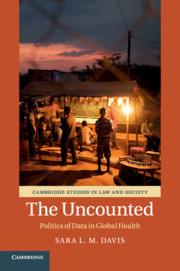Book contents
- The Uncounted
- Cambridge Studies in Law and Society
- The Uncounted
- Copyright page
- Contents
- Figures
- Tables
- Abbreviations and Terms
- Chapter 1 Contested Indicators
- Chapter 2 The Uncounted: Key Populations
- Chapter 3 “Something More than Data”
- Chapter 4 Cost-Effectiveness and Human Rights
- Chapter 5 Modeling the End of AIDS
- Chapter 6 Sustainability, Transition, and Crisis
- Chapter 7 Listening to Women
- Chapter 8 “So Many Hurdles Just to Leave the House”
- Chapter 9 The Panopticon and the Potemkin
- Chapter 10 Data from the Ground Up
- Reflection Questions
- Acknowledgments
- References
- Index
- Cambridge Studies in Law and Society
Chapter 7 - Listening to Women
Published online by Cambridge University Press: 18 May 2020
- The Uncounted
- Cambridge Studies in Law and Society
- The Uncounted
- Copyright page
- Contents
- Figures
- Tables
- Abbreviations and Terms
- Chapter 1 Contested Indicators
- Chapter 2 The Uncounted: Key Populations
- Chapter 3 “Something More than Data”
- Chapter 4 Cost-Effectiveness and Human Rights
- Chapter 5 Modeling the End of AIDS
- Chapter 6 Sustainability, Transition, and Crisis
- Chapter 7 Listening to Women
- Chapter 8 “So Many Hurdles Just to Leave the House”
- Chapter 9 The Panopticon and the Potemkin
- Chapter 10 Data from the Ground Up
- Reflection Questions
- Acknowledgments
- References
- Index
- Cambridge Studies in Law and Society
Summary
Global health donors, under pressure to demonstrate progress in order to persuade US and UK government representatives to continue funding for the global HIV response, have intensified efforts to get more people at risk of HIV to test and know their status in high-prevalence regions, such as East and Southern Africa. PEPFAR, the US bilateral HIV financing program, has mastered doing this by using granular data to set priorities and manage funding. Women living with HIV in Kenya have raised concerns about the donor-driven practice of assisted partner notification services (aPNS), an approach in which those who test positive for HIV are required to share the contacts of their sexual partners with health workers, in order to inform those partners that they are at risk and should test for HIV. This chapter examines the delicate problem of eliciting disclosure of intimate partner violence safely and ethically, and how this is neglected in the academic studies on which the World Health Organizations based its recommendations. It shows that lack of evidence of domestic violence was used as evidence of lack of such violence, in order to promote donor-driven efforts to test more people for HIV.
Keywords
- Type
- Chapter
- Information
- The UncountedPolitics of Data in Global Health, pp. 173 - 197Publisher: Cambridge University PressPrint publication year: 2020

